
McDonough is a city in Henry County, Georgia, United States. It is part of the Atlanta metropolitan area. Its population was 22,084 at the 2010 census, up from 8,493 in 2000. The city is the county seat of Henry County.
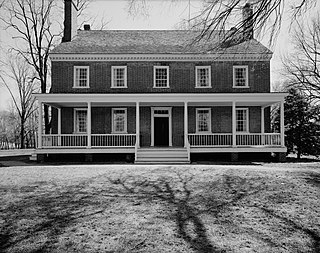
Historic Locust Grove is a 55-acre 18th-century farm site and National Historic Landmark situated in eastern Jefferson County, Kentucky. The site is owned by the Louisville Metro government, and operated as a historic interpretive site by Historic Locust Grove, Inc.
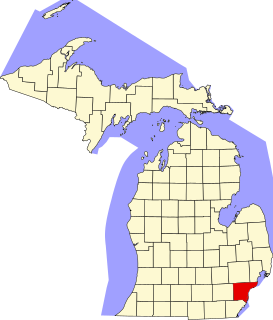
This is a list of the National Register of Historic Places listings in Wayne County, Michigan.

Rapidan is a small unincorporated community in the Virginia counties of Culpeper and Orange, approximately 5 miles (8 km) northeast of the Town of Orange. The community, located on both sides of the Rapidan River, was established in the late eighteenth century around the Waugh's Ford mill. The Orange and Alexandria Railroad built a line through the town in 1854, a post office was built at the river crossing, and its name was changed to Rapid Ann Station. Milling remained a major industry in the area up through the mid-twentieth century.
This is an incomplete list of historic properties and districts at United States colleges and universities that are listed on the National Register of Historic Places (NRHP). This includes National Historic Landmarks (NHLs) and other National Register of Historic Places listings. It includes listings at current and former educational institutions.
William Augustus Edwards, also known as William A. Edwards was an Atlanta-based American architect renowned for the educational buildings, courthouses and other public and private buildings that he designed in Florida, Georgia and his native South Carolina. More than 25 of his works have been listed on the National Register of Historic Places.

The Newtown Borough Historic District is a 100-acre (40 ha) historic district in the borough of Newtown within the town of Newtown in Fairfield County, Connecticut. There is a local historic district, and an overlapping district that was listed on the National Register of Historic Places in 1996.
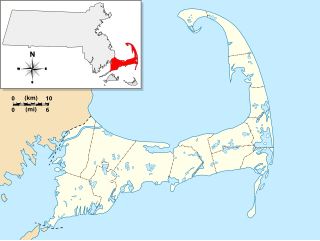
The Old Town Center Historic District is a historic district roughly along Locust Public Rd. and Salt Pond Road in Eastham, Massachusetts. The district encompasses Eastham's original town center, with a cluster of well-preserved 18th- and 19th-century buildings. The area served as the town's civic center due to its proximity to Salt Pond, which provided access to the Atlantic Ocean, and was a major transportation route. The advent of the railroad in the 1870s shifted the town's economic and civic heart to the present center. The Old Town district is 40 acres (16 ha) in size, with 42 mainly residential buildings contributing to its significance. The oldest building in the district is the c. 1672 John Knowles House at 191 Locust Road. The town's first town hall (1851) and first schoolhouse (1869) still stand in the district; the schoolhouse is a landmark visible from Route 6.

The Teaticket School is a historic former school building at 340 Teaticket Hwy in Falmouth, Massachusetts. Built in 1927, this large Colonial Revival building was the first consolidated elementary school in the town. It has since 1967 served as the Administration Building for the Falmouth Public Schools. It was listed on the National Register of Historic Places in 2002.

College Grove is an unincorporated community near Franklin and Murfreesboro in Williamson County, Tennessee. College Grove is predominantly rural.
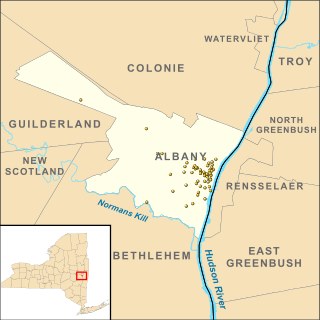
There are 69 properties listed on the National Register of Historic Places in Albany, New York, United States. Six are additionally designated as National Historic Landmarks (NHLs), the most of any city in the state after New York City. Another 14 are historic districts, for which 20 of the listings are also contributing properties. Two properties, both buildings, that had been listed in the past but have since been demolished have been delisted; one building that is also no longer extant remains listed.

There are eight properties listed on the National Register of Historic Places (NRHP) in Linn County, Kansas.

Ellington Center Historic District is an 80-acre (32 ha) historic district in the town of Ellington, Connecticut that was listed on the National Register of Historic Places in 1990.

Bruce & Morgan was an architectural firm in Georgia. It was a partnership during 1882 to 1904 of Alexander Bruce (1835-1927) and Thomas Henry Morgan (1857-1940.

James Wingfield Golucke (1865–1907), often known as J.W. Golucke, was an American architect based in Atlanta, Georgia.
Frank E. Wetherell (1869-1961) was an architect in the U.S. state of Iowa who worked during 1892–1931. He founded the second oldest architectural firm in the state in Des Moines, Iowa, in 1905. He worked with Roland Harrison in partnership Wetherell & Harrison. The firm designed numerous Masonic buildings.

Van Ryn & DeGelleke was an architectural firm in Wisconsin. It was a partnership of Henry J. Van Ryn and Gerrit Jacob DeGelleke, both of whom grew up in Milwaukee.
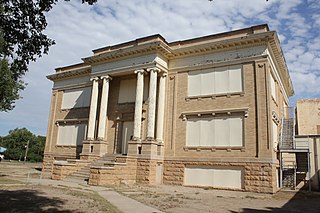
The Bent County High School, in Bent County, Colorado at 1214 Ambassador Thompson Blvd in Las Animas, is a historic school that was built in 1913 or 1914. It has been deemed notable for association with former U.S. Ambassador Llewellyn Thompson, Ken Curtis, and author James Michener’s wife, Mari (Sabusawa) Michener, all of whom attended the school, as well as for "its imposing, three-story, massive-columned architecture". It was designed by Swedish architect James Larson. The building was listed on the National Register of Historic Places (NRHP) in 2010.
Routledge & Hertz was an architectural and engineering firm of Hutchinson, Kansas which was organized in 1925 and operated through 1932.
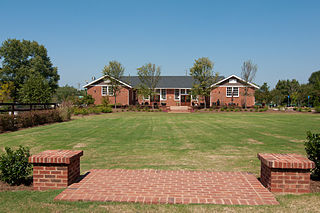
Newtown Elementary School, in what is now Johns Creek, Georgia, was built in 1929. It was listed on the National Register of Historic Places in August 2006.



















